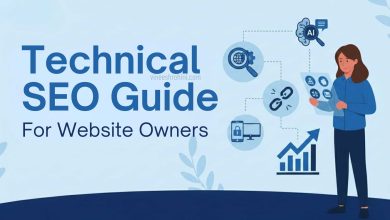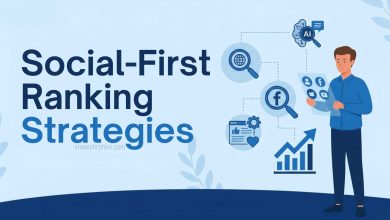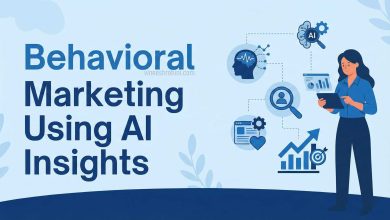Why SEO is Important ? : Comprehensive Guide 2024
Why SEO is Important : Search Engine Optimization (SEO) has become a cornerstone of digital marketing in the 21st century. As businesses increasingly move online, the ability to stand out among billions of web pages becomes critical. SEO is the practice of optimizing a website to improve its visibility on search engines like Google, Bing, and Yahoo. It is essential for driving organic traffic, enhancing user experience, and fostering growth.
Table of Contents
In this essay, we’ll explore the importance of SEO, its core components, benefits, challenges, and future trends, providing a detailed understanding of its significance in today’s digital landscape.
Understanding SEO

1. What is SEO?
SEO refers to the process of improving a website’s visibility on search engine results pages (SERPs) through unpaid, organic means.
Also Read : What is AEO in Digital Marketing?
It involves optimizing content, site structure, and technical aspects to align with search engine algorithms, ensuring higher rankings for relevant queries.
2. How Search Engines Work
Search engines operate using three primary processes:
- Crawling: Bots scan the internet to discover new or updated pages.
- Indexing: Discovered pages are stored in a database, ready to be retrieved for search queries.
- Ranking: Pages are ranked based on relevance, quality, and other factors determined by complex algorithms.
3. The Role of Keywords
Keywords are phrases or terms users type into search engines. By incorporating relevant keywords strategically, websites can align their content with user intent, making them more likely to appear in search results.
Why SEO is Important
1. Increased Visibility and Traffic
SEO enhances a website’s visibility in search engines, ensuring that it appears prominently for relevant searches. Since the majority of users click on one of the first few results, higher rankings translate directly into increased organic traffic.
2. Cost-Effective Marketing
Unlike paid advertising, SEO focuses on earning traffic organically. While it requires time and effort, the long-term benefits make it more cost-effective than continuous ad campaigns.
3. Better User Experience
SEO involves optimizing websites for speed, mobile responsiveness, and usability. This not only improves rankings but also enhances the user experience, leading to higher engagement and satisfaction.
4. Credibility and Trust
Websites that rank higher are perceived as more credible and trustworthy by users. Factors like backlinks, quality content, and strong domain authority contribute to this perception.
5. Local Business Growth
Local SEO is crucial for businesses targeting specific geographic areas. Optimizing for “near me” searches and Google My Business listings helps local businesses attract nearby customers.
6. Competitive Advantage
In highly competitive markets, SEO can give businesses an edge. Companies that invest in SEO are better positioned to capture market share and outperform competitors who neglect it.
Core Components of SEO
To understand why SEO is important, it’s essential to explore its core components:
1. On-Page SEO
On-page SEO focuses on optimizing individual web pages to improve rankings. Key aspects include:
- Keyword Optimization: Strategically placing keywords in titles, headers, and content.
- Content Quality: Creating valuable, relevant, and engaging content.
- Meta Tags: Writing compelling meta descriptions and title tags.
- Internal Linking: Connecting pages within a website to enhance navigation.
2. Off-Page SEO
Off-page SEO involves activities outside the website that boost its authority and reputation. This includes:
- Backlinks: Earning links from reputable websites signals trustworthiness.
- Social Media: Sharing content on social platforms increases visibility and traffic.
- Brand Mentions: Being mentioned on other websites enhances credibility.
3. Technical SEO
Technical SEO ensures that a website is accessible and understandable to search engines. It involves:
- Site Speed: Faster loading pages improve user experience and rankings.
- Mobile Optimization: Ensuring websites are responsive across devices.
- Secure Protocols: Using HTTPS to protect user data.
- XML Sitemaps and Robots.txt: Helping search engines navigate the site efficiently.
4. Local SEO
Local SEO focuses on optimizing a business for location-based searches. Strategies include:
- Optimizing Google My Business profiles.
- Gathering positive online reviews.
- Ensuring consistent name, address, and phone number (NAP) information across platforms.
Benefits of SEO
1. Drives Quality Traffic
Unlike traditional advertising, SEO targets users actively searching for specific products or services, resulting in higher-quality leads.
2. Sustainability
SEO provides long-term results. Once a website ranks well, it continues to attract traffic without the ongoing costs associated with paid campaigns.
3. Enhances Brand Awareness
High rankings on SERPs expose a brand to a wider audience, building recognition and trust over time.
4. Boosts Conversion Rates
SEO not only drives traffic but also attracts users with high purchase intent, increasing conversion rates.
5. Supports Other Marketing Efforts
SEO complements content marketing, social media campaigns, and even paid ads, amplifying their impact.
Challenges of SEO

While SEO is highly effective, it comes with challenges:
1. Constant Algorithm Changes
Search engines frequently update their algorithms, requiring marketers to adapt strategies. Staying informed is critical to maintaining rankings.
2. Time-Intensive
SEO is not a quick fix. Building authority and ranking higher can take months of consistent effort.
3. High Competition
Popular niches often have fierce competition, making it difficult for newcomers to rank.
4. Technical Complexity
Mastering technical SEO aspects, like server configurations and schema markup, can be challenging for beginners.
SEO in Different Industries
1. E-Commerce
SEO is vital for online stores to attract customers. Optimizing product pages, creating blog content, and using local SEO for physical stores are common strategies.
2. Healthcare
Medical professionals and clinics use SEO to appear in local searches and provide credible information through blogs and articles.
3. Education
Educational institutions leverage SEO to attract students by optimizing course pages and creating informative content about academic programs.
4. Hospitality
Hotels, restaurants, and travel agencies benefit from local SEO and user-generated reviews to drive bookings and reservations.
The Future of SEO
SEO continues to evolve as technology advances. Emerging trends include:
1. Voice Search Optimization
The rise of virtual assistants like Alexa and Siri makes optimizing for voice queries essential. Voice searches are often longer and conversational, requiring a focus on natural language keywords.
2. AI and Machine Learning
Search engines increasingly use AI to understand user intent. SEO professionals must create content that aligns with user needs and preferences.
3. Core Web Vitals
Google’s emphasis on metrics like page speed, interactivity, and visual stability highlights the importance of user experience in SEO.
4. Video SEO
As video content dominates online consumption, optimizing videos for platforms like YouTube and embedding them on websites will become crucial.
5. Sustainability and Ethics
Ethical SEO practices, transparency, and focusing on user value will become increasingly important as search engines crack down on black-hat tactics.
SEO Case Studies
1. Amazon’s Dominance
Amazon ranks highly on Google for countless product searches due to its strong SEO strategy, which includes detailed product descriptions, user reviews, and a vast inventory.
2. HubSpot’s Content Strategy
HubSpot excels in SEO through high-quality blog content targeting industry-relevant keywords. Its inbound marketing strategy drives consistent traffic and leads.
3. Airbnb’s Local SEO
Airbnb leverages local SEO by optimizing listings for location-specific searches, making it a go-to platform for travelers worldwide.
Tips for Implementing Effective SEO
1. Focus on User Intent
Create content that directly answers users’ questions and addresses their needs.
2. Update Content Regularly
Fresh, updated content signals relevance to search engines and keeps users engaged.
3. Leverage Analytics
Use tools like Google Analytics to track performance and refine strategies.
4. Optimize for Mobile
Ensure websites provide a seamless experience across all devices.
5. Invest in High-Quality Backlinks
Focus on earning backlinks from reputable websites to boost domain authority.
Why SEO is Important – Conclusion :

SEO is not just a marketing tactic; it’s a necessity in today’s digital-first world. It drives visibility, builds trust, and supports long-term business growth. While challenges exist, the benefits of SEO far outweigh the drawbacks, making it an indispensable tool for businesses across industries.
Buy Now :: SEO Mastery Detailed Course
As technology evolves, staying ahead of trends and prioritizing user experience will ensure continued success in SEO. By investing in SEO, businesses can secure a competitive edge, attract quality traffic, and achieve sustainable growth in an increasingly crowded online marketplace.
Keywords : Why SEO is Important – Why SEO is Important 2024 – Why SEO is Important 2025



